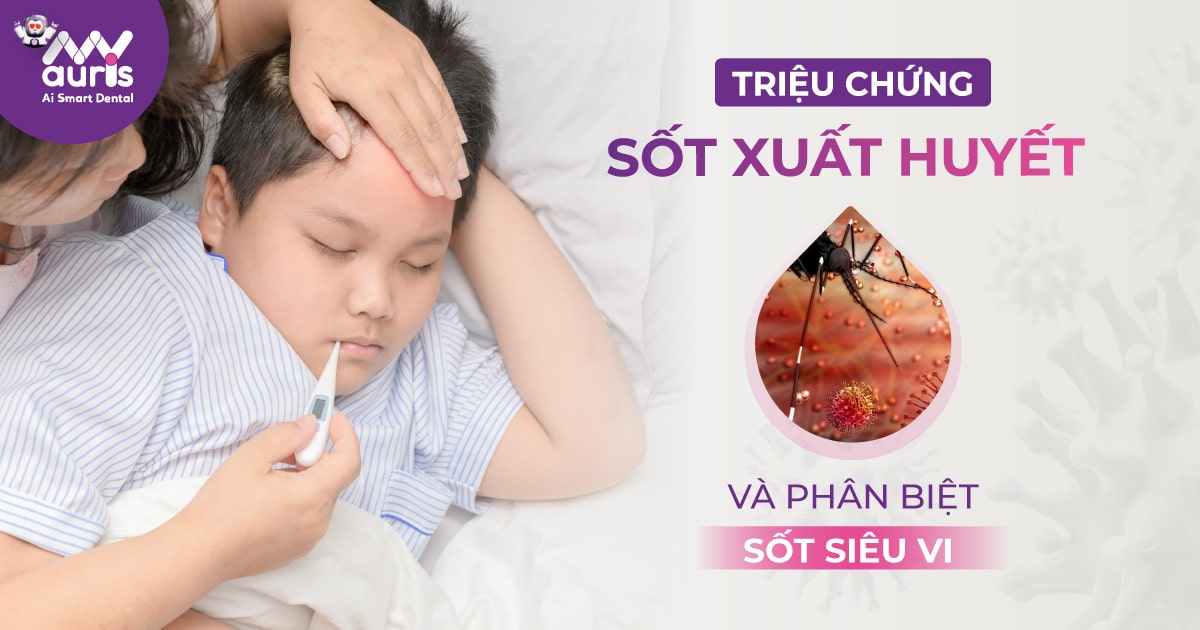What are the symptoms of dengue fever in children. Dengue fever is one of the infectious diseases that causes many dangers, especially for young children. Therefore, when children have symptoms of dengue fever, parents need to quickly recognize the disease to take their children for timely examination and treatment. Join My Auris to learn in detail about dengue fever in children!
What are the symptoms of dengue fever in children?
According to experts, dengue fever symptoms in children in each stage of the disease’s development follow different trends, specifically:
Fever stage
In the early stages of dengue fever in children, children have sudden and continuous high fever. Children often tend to be uncomfortable and cry. If the child is older, he or she will complain of headaches, loss of appetite, congested skin, muscle and joint pain, pain in the eye sockets, etc. bleeding gums or nosebleeds.

The dangerous stage
After the fever stage, there will be a dangerous stage that will fall into on days 3 – 7 after illness. Symptoms of dengue fever in children when the fever is still there or have subsided, last for about 24 – 48 hours.
Recovery phase
After the dangerous period of about 48 – 72 hours will be the recovery phase. When the child’s fever disappears, his condition improves a lot, such as appetite, stable blood pressure, and more frequent urination. Furthermore, when blood tests show that the number of white blood cells increases rapidly, the number of platelets gradually returns to normal, but often slower than that of white blood cells.
However, dengue fever has similar symptoms to viral fever. Therefore, when there are signs of fever, parents should take their children to the nearest medical station or hospital for proper examination and treatment.
Distinguishing symptoms of dengue fever and viral fever in children em
Even though both dengue fever and viral fever have some things in common. High body temperature (fever) is the first symptom of most diseases. However, as dengue cases have increased recently, detecting the disease at an early stage has become more important. Therefore, parents should distinguish between dengue fever and viral fever, which are not caused by virusesa.

Form of infection
While viral fever is transmitted through the air, by droplets splashing air from sick people or touching contaminated surfaces. In contrast, dengue fever results from the bite of an Aedes mosquito (scientific name Aedes Aegypti). Viral fever can last for 3 – 5 days, while dengue fever lasts for 2 – 7 days or even longer if not treated promptly.
In addition, viral fever is contagious and spreads from person to person. On the other hand, dengue fever cannot be transmitted by contact and is not transmitted through natural air.
Dengue fever causes high fever
Symptoms of normal viral fever will not be serious due to dengue infection, with symptoms such as runny nose, sore throat, muscle pain. mild form, weakness… Children with dengue fever may have high fever, severe body aches, joint pain and rash within 24 – 48 hours.
Low platelet count is a sign of dengue fever
To know if your child has dengue fever? Take your child for a blood test and a Dengue NS1 antigen test. Experts believe that about 80 – 90% of patients with dengue fever have platelet counts lower than 100,000, while 10 – 20% of patients will see a severe level of 20,000 or less.
On the contrary, children with viral fever will not suffer these complications, although However, a low platelet count can be a sign of other diseases. It’s best to take your child for a health checkup.

How to treat dengue fever in children em
When you see signs of dengue fever in your child, you need to take your child to the hospital for an accurate diagnosis. In most cases, children with dengue fever can be treated at home and until the endGet a full examination according to your doctor’s appointment. Furthermore, you need to pay attention to your doctor’s instructions to achieve the fastest results in dengue fever treatment, specifically as follows:
- If your child’s fever is over 39 degrees Celsius, you need to give your child paracetamol fever-reducing medicine as prescribed by the doctor. Then, loosen your clothes and wipe cool all over your body. Note, do not let children use aspirin or ibuprofen, this can lead to bleeding and acidosis;
- Encourage and encourage your baby to drink lots of water (cooled boiled water), oresol, fruit juice (orange, lemon,.) or porridge diluted with salt to supplement your baby’s electrolytes.
- The daily diet should be divided into many small meals, diluted foods, easy to digest, and nutritionally balanced. Especially do not use dark colored foods and drinks (to avoid confusion with gastrointestinal bleeding).
- Children should rest at home and limit exercise while they have dengue fever;
- In case the child cannot drink water with symptoms such as vomiting a lot, lethargy, and not being alert. Take your child to a medical facility for further examination.
However, while taking care of a child with dengue fever, it is necessary to take the child to a medical facility for timely examination and treatment by doctors if the child has the following symptoms:
- Struggling, lethargic;
- Abdominal pain is getting worse;
- Congested skin but cold extremities;
- Sudden and persistent vomiting;
- Sudden gastrointestinal bleeding;
How to prevent dengue fever in children?
Up to now, Vietnam has no specific medicine or vaccine to prevent dengue fever. However, parents have preventive measures to proactively control disease-transmitting insects such as killing larvae, killing adult mosquitoes, cleaning the living environment, and eliminating stagnant water reservoirs.
In addition, parents should let their children wear long-sleeved clothes. And train children to have the habit of sleeping under mosquito nets (even during the day).
Dengue fever is a condition that requires immediate emergency medical attention or hospitalization for monitoring. However, there is no specific way for dengue fever in general and dengue fever signs in particular. Furthermore, tMonitoring the period of dengue shock from 24 to 48 hours is very important, it can be life-threatening or even fatal. Therefore, do not be subjective about your child’s health!
Kim Dung





